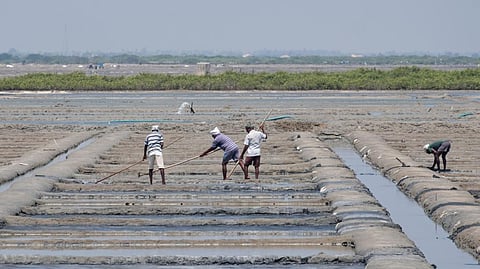

Heat exposure led to the loss of 490 billion potential labour hours in 2022, a nearly 42 per cent increase from 1991-2000, according to the latest edition of the Lancet Countdown on Health and Climate Change.
The report calculated heat-related labour capacity loss for 195 countries with the United Nations estimates of occupational sunlight exposure and working-age populations.
In India, 191 billion potential labour hours were lost due to heat exposure in 2022, an increase of 54 per cent from 1991-2000. This translated to a $219 billion potential associated income loss in 2022, equivalent to 6.3 per cent of the country’s GDP.
Agricultural workers were hit the hardest, seeing 64 per cent of the potential hours lost and 55 per cent of the potential income losses in 2022, the report said.
Agricultural workers are the worst affected in many countries, with the burden often shifting to those in construction in higher income countries, such as the US.
On average, each worker in the world lost 143 potential hours of labour capacity. Over 1.3 billion workers, 39 per cent of the global workforce, experienced losses greater than that, and 80 per cent of these were from low- or medium-Human Development Index (HDI) countries.
“By 2041-60 (and without further adaptation), a scenario compatible with limiting temperature rise to 2°C would result in more than a doubling of potential labour hours lost annually compared with the 1995-2014 period; with no further mitigation, this would be nearly 2.5 times higher,” the report said.
“Economic losses from extreme weather events increased by 23 per cent between 2010–14 and 2018–22, amounting to $264 billion in 2022 alone, whereas heat exposure led to global potential income losses worth $863 billion,” the report said.
“Labour capacity loss resulting from heat exposure affected low- and medium-HDI countries the most, exacerbating global inequities, with potential income losses equivalent to 6·1 per cent and 3·8 per cent of their gross domestic product, respectively," the report added.
The report was released ahead of the 28th Conference of the Parties (COP28) to the United Nations Framework Convention on Climate Change, which will be the first to have a dedicated day for the monumental impact climate change will have on health.
Last year’s Lancet Countdown report warned about the health consequences of fossil fuels and highlighted the opportunity to transition to cleaner fuels. However, data this year show that “Energy-related carbon dioxide emissions increased by 0.9 per cent to a record 36.8 Gt in 2022, and still only 9.5 per cent of global electricity comes from modern renewables (mainly solar and wind energy), despite their costs falling below that of fossil fuels.”
Recently, 46 million health professionals penned an open letter addressed to the COP28 Presidency. “We call on the COP28 Presidency and the leaders of all countries to commit to an accelerated, just, and equitable phase-out of fossil fuels as the decisive path to health for all. Ending our dangerous dependency on fossil fuels will improve the health prospects of future generations and will save lives,” it said.
“The continuing expansion of fossil fuels is a death sentence to millions. There is no excuse for a persistent delay in climate action. Temperature rise must be limited to 1.5°C to avert the worst of climate change, save millions of lives, and help protect the health of everyone on earth,” UN secretary-general, António Guterres, said in the report.